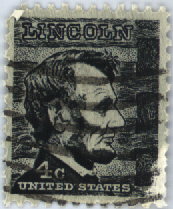FRtR > Presidents > Abraham Lincoln > The Emancipation Proclamation > Context
Abraham Lincoln
The Emancipation Proclamation (1863) - Context
*** Text ***
 On Jan. 1, 1863, U.S.
President Abraham Lincoln declared free
all slaves residing in territory in rebellion against the federal
government. This Emancipation Proclamation actually freed few
people. It did not apply to slaves in border states fighting on
the Union side; nor did it affect slaves in southern areas already
under Union control. Naturally, the states in rebellion did not
act on Lincoln's order. But the proclamation did show Americans--
and the world--that the civil war was now being fought to end slavery.
On Jan. 1, 1863, U.S.
President Abraham Lincoln declared free
all slaves residing in territory in rebellion against the federal
government. This Emancipation Proclamation actually freed few
people. It did not apply to slaves in border states fighting on
the Union side; nor did it affect slaves in southern areas already
under Union control. Naturally, the states in rebellion did not
act on Lincoln's order. But the proclamation did show Americans--
and the world--that the civil war was now being fought to end slavery.
Lincoln had been reluctant to come to this position. A believer
in white supremacy, he initially viewed the war only in terms of
preserving the Union. As pressure for abolition mounted in
Congress and the country, however, Lincoln became more sympathetic
to the idea. On Sept. 22, 1862, he issued a preliminary proclamation
announcing that emancipation would become effective on Jan. 1, 1863,
in those states still in rebellion. Although the Emancipation
Proclamation did not end slavery in America--this was achieved
by the passage of the 13TH Amendment to the Constitution on Dec.
18, 1865--it did make that accomplishment a basic war goal and
a virtual certainty.
DOUGLAS T. MILLER
Bibliography: Commager, Henry Steele, The Great Proclamation
(1960); Donovan, Frank, Mr. Lincoln's Proclamation (1964);
Franklin, John Hope, ed., The Emancipation Proclamation (1964).
 On Jan. 1, 1863, U.S.
President Abraham Lincoln declared free
all slaves residing in territory in rebellion against the federal
government. This Emancipation Proclamation actually freed few
people. It did not apply to slaves in border states fighting on
the Union side; nor did it affect slaves in southern areas already
under Union control. Naturally, the states in rebellion did not
act on Lincoln's order. But the proclamation did show Americans--
and the world--that the civil war was now being fought to end slavery.
On Jan. 1, 1863, U.S.
President Abraham Lincoln declared free
all slaves residing in territory in rebellion against the federal
government. This Emancipation Proclamation actually freed few
people. It did not apply to slaves in border states fighting on
the Union side; nor did it affect slaves in southern areas already
under Union control. Naturally, the states in rebellion did not
act on Lincoln's order. But the proclamation did show Americans--
and the world--that the civil war was now being fought to end slavery.